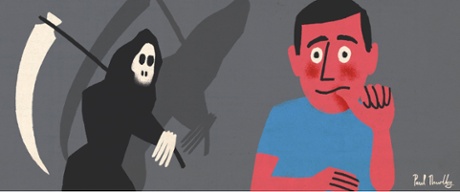
Nearly 60 years ago, in an anthropology journal, the US academic Horace Miner reported on the exotic customs of the Nacirema, a people noted for their rituals designed to deny the inevitability of death. Each Nacirema home, he explained, had a shrine with a small chest on the wall, full of “charms and magical potions” for prolonging life; tribe members made twice-yearly visits to “holy-mouth-men” with the power to rejuvenate their teeth. The Nacirema showed “pervasive aversion to the natural body and its functions”, including procedures “to make women’s breasts larger if they are small, and smaller if they are large.”
You might wonder what kind of messed-up people such a reality-denying culture would produce – until you get the joke. (Spell it backwards.) But it’s not just the Nacirema. All we supposedly rational modern people construct our lives so as to feel, as much of the time as possible, like we won’t have to die.
Or that’s the sense you get, anyhow, from The Worm At The Core, a new book summarising decades of research in “terror management theory (TMT)”, which explores the ways we try to cope with the knowledge of our mortality. (The authors are the pioneers of TMT, Sheldon Solomon, Jeff Greenberg and Tom Pyszczynski.)
It’s easy enough to see the death-denying motives behind religion, art, or parenthood, or the quest for fame. But it’s scarier to learn of all the smaller, daily ways the anxiety makes itself felt. In one study, judges reminded of their mortality were harsher toward an alleged prostitute; in another, Germans interviewed in front of a cemetery showed stronger nationalistic preferences for German food and cars. It’s even been shown that people believe planes with celebrities on board are less likely to crash, as if their aura of immortality protects us all.
We are desperate not to think of ourselves as animals, subject to the usual creaturely cycles of birth and death. Thus people primed to think of death become more accepting of other animals being killed for food or research: it’s as if their beliefs adjust so as to shore up the distinction between us and them. They also become more likely to use euphemisms (“number two”) to describe bodily processes. Might something similar explain climate change denialism – an intense subconscious need to feel immune from the natural order, because for creatures subject to that order, life can end only one way?
In techno-futurist circles, there’s talk of radically extending human lifespans, or maybe “solving death”. But even if we managed this, the authors note, it might make death anxiety worse: you still couldn’t rule out accidents, and wouldn’t the prospect of (say) dying in a plane crash at 50 be worse when everyone else lived to 300? Ultimately, the only solution may be the one suggested by Albert Camus, scribbled in the margins of one of his notebooks: “Come to terms with death. Thereafter anything is possible.”
Well, it’s good to have something to aim for.
• oliver.burkeman@theguardian.com

